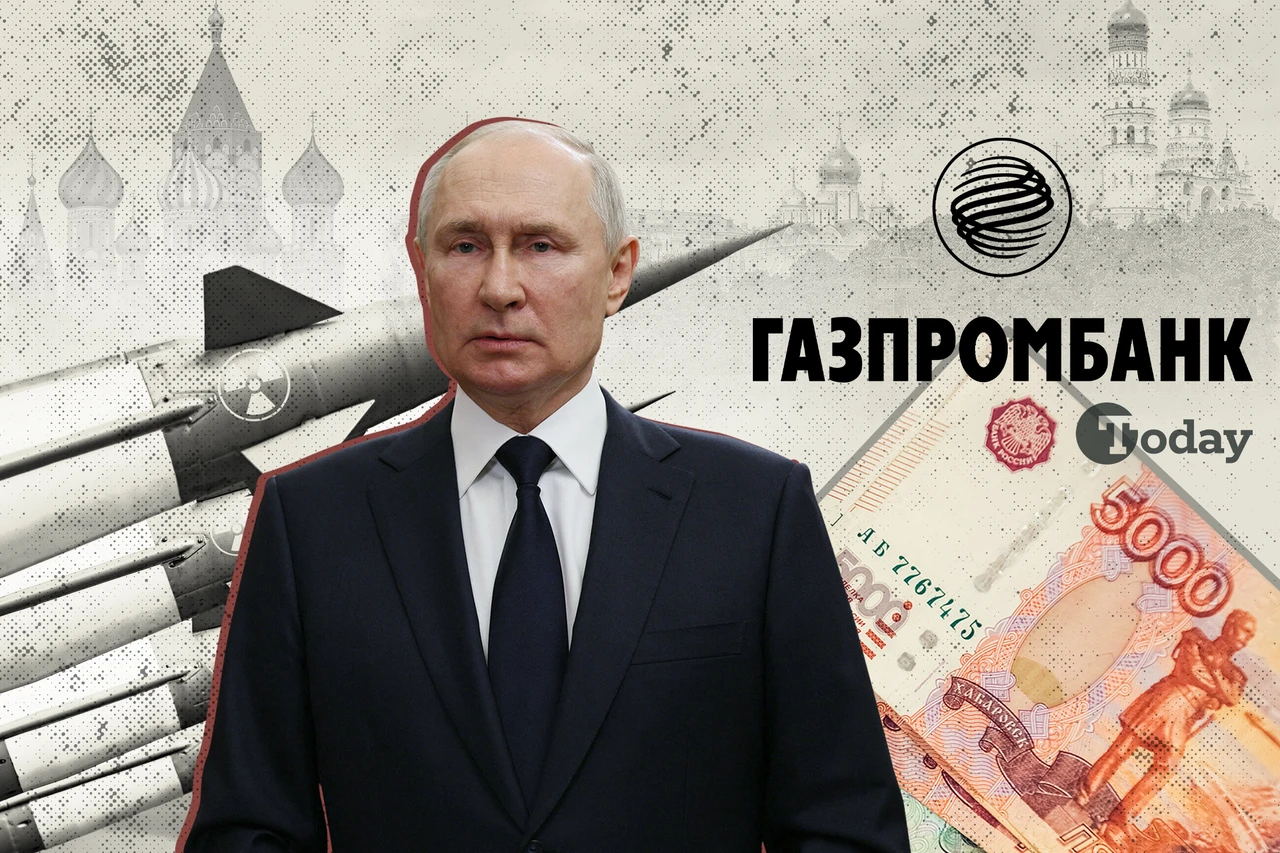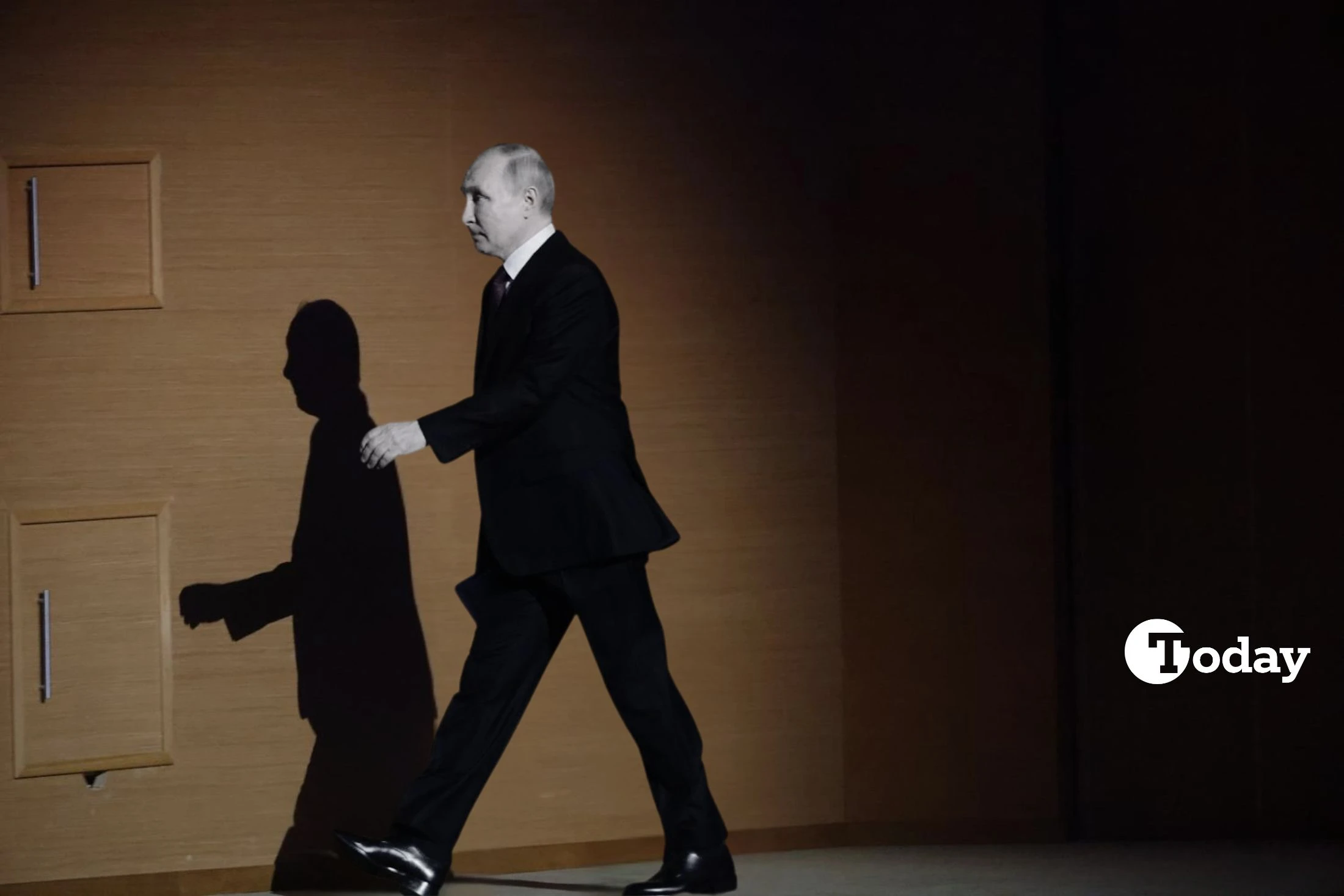Russia might turn focus if war on Ukraine concludes
 Russian President Vladimir Putin amid symbols of economic and geopolitical tensions: nuclear missiles, the Gazprombank logo, and the devalued ruble. (Collage by Türkiye Today team)
Russian President Vladimir Putin amid symbols of economic and geopolitical tensions: nuclear missiles, the Gazprombank logo, and the devalued ruble. (Collage by Türkiye Today team)
A growing number of experts warn that even if the war in Ukraine ends, the military risks posed by Russia will not diminish. Instead, they argue that the country, emboldened by its war experience and strategic readjustments, may remain a constant threat to the interests of neighboring and Western countries.
A Russian expert echoing this argument while making another point recently remarked, “The moment we conclude an agreement with Trump, our eyes will shift immediately to the South Caucasus.”
The possibility that Russia’s geopolitical ambitions may extend far beyond Ukraine and will likely manifest in other key regions, whether it is Europe, the Baltics, the South Caucasus, Central Asia, or Libya and wider MENA. The question is not if Russia will pivot its focus, but rather where and how quickly it will act.
Uncertainty surrounding Ukrainian peace deal
While discussions of a potential cease-fire or peace agreement between Ukraine and Russia remain speculative, analysts like Murad Muradov, founder and deputy director of Azerbaijan’s Topchubashov Center, caution against assuming an imminent resolution. “We cannot say for sure at this moment what the probability of a Ukrainian cease-fire or another kind of deal is,” he noted, emphasizing that although a settlement may be more likely under a Trump administration, it remains far from certain.
Ukraine’s ability to leverage its position with Western allies complicates the picture. “Ukraine has learned to manipulate the U.S. and European countries, applying pressure by highlighting the stakes involved,” Muradov explained.
The implications of a settlement perceived as a defeat for Ukraine could deal a significant blow to Western credibility, raising concerns among allied nations. “It would be a major blow politically and to the West’s prestige,” he warned, underscoring the strategic considerations that could delay any agreement.

Russia’s next move
A pivotal question in geopolitical circles is how the Kremlin might redistribute its attention and influence once a resolution—however tenuous—is reached in Ukraine. Some experts believe Moscow will refocus its strategic priorities elsewhere, particularly in regions like the Baltics, the South Caucasus, Central Asia, and Libya. Muradov suggests that, in the short term, Moscow’s capacity for further military engagements may be constrained because of heavy losses suffered in Ukraine.
“The more this war drags on, the less capable Russia will be of deploying large-scale military resources elsewhere,” he states, citing accumulated damage to military infrastructure and personnel losses that may number close to a million, including both fatalities and injuries.
Despite these limitations, certain areas remain highly susceptible to the Kremlin’s influence. Muradov points to growing concerns in the Baltics, where nations like Finland and Sweden are bracing for potential Russian aggression. “Messages from the capitals of Baltic countries suggest they are preparing for some kind of aggression within the next two to three years,” he noted.
One critical factor is former President Donald Trump’s stance on NATO, which has led some to doubt whether the U.S. would intervene in the event of Russian provocations. “If Moscow attacks the Baltics, I wouldn’t be sure Trump would come to their rescue. He may view NATO’s obligations differently, questioning whether America should risk a war with a nuclear power over those countries.”
According to international relations expert Ahmad Shahidov, Russia must first recover before considering another military move. While not entirely through its own efforts, Putin can leverage political maneuvers in Europe, particularly through pro-Russian far-right governments. The rise of the movement, at the very least, contributes to Russia’s goal of fostering instability in Europe.
South Caucasus, Central Asia
While concerns about the Baltics are immediate, Muradov sees a different dynamic unfolding in the South Caucasus. “Here, we have Iran and Türkiye as key players and Turkish-Russian relations are not as cordial as they used to be,” he observed.
Given Ankara’s vested interest in the region, Moscow will need to tread carefully. Instead of direct intervention, Moscow may focus on strengthening ties with the Georgian government to bring it decisively under its sphere of influence. “Russia will likely intensify its support for Georgia’s government, encouraging closer alignment with Moscow.”
Regarding Central Asia, Muradov downplays the likelihood of Russian aggression, citing China’s strong influence in the region. “I don’t think Russia would want to antagonize China. Their relationship is often described as a ‘partnership without limits,’ but there are indeed limits. Central Asia is a red line Russia is unlikely to cross.” This indicates that while Russia may seek influence, it will likely avoid outright confrontation with Beijing over these territories.
Libya, wider MENA
With its deepening partnerships with rogue states such as Iran and North Korea, Russia is poised to extend its influence in the Middle East and North Africa (MENA). Libya remains a key arena where Russian interests have been evident through the presence of Wagner Group mercenaries. “Once the war in Ukraine winds down, Russia could devote significantly more resources to groups or governments that challenge US interests in the region,” Muradov suggests.
A particularly alarming scenario involves Moscow’s role in conflicts such as the one involving Yemen’s Houthi militias. “If Russia were to increase its support for the Houthis, providing them with more advanced missile systems, the risks to global trade in the Red Sea would escalate dramatically.”
The potential for further destabilization remains high, particularly as Russia aligns itself with actors seeking to challenge Western dominance in strategic waterways and energy markets.

‘Shadow war’
Russia’s covert operations against the West have intensified, targeting individuals and institutions supporting Ukraine while sowing discord within Western societies. A recent U.S. Helsinki Commission hearing outlined numerous attacks, including foiled arson attempts, bombings, and assassination plots across Europe.
European authorities widely believe these incidents are part of a coordinated Russian strategy, reflecting an escalating “shadow war” that extends traditional military engagement.
According to Elizabeth Shackelford, Russia is waging an extensive information war, spreading disinformation through fake articles, cloned websites, and manipulated social media narratives to influence public opinion and elections beyond its physical sabotage. European governments have also faced unconventional destabilization efforts, such as last year’s deliberate migrant surge at Finland’s border, engineered to create political and humanitarian crises, Shackelford points out.
According to historian Dr. Ramin Sadik, the Baltic states and Poland, as Ukraine’s staunchest allies, continue to perceive Russia as a major threat, no matter whether the fire ceases or not.
However, he argued these nations are in a heightened state of alarm and that, given Russia’s actual capabilities, its potential actions in these regions are likely to remain limited.
More assertive Russia
The trajectory of Russian foreign policy post-Ukraine remains a subject of intense debate, but one conclusion is clear—Moscow will continue to seek opportunities to challenge Western influence. Whether in the Baltics, the South Caucasus, Central Asia, or the MENA region, Russia will exploit geopolitical openings wherever it can. As Muradov warned, “Even if Russia is weakened from the war, its military experience now exceeds that of most European countries. It’s a new reality, and the West must be much more careful than it used to be.”
The international community must brace for the next phase of Russian assertiveness, whether through military posturing, political influence, or economic maneuvering.
How effectively Western powers respond to these threats may well determine the shape of global security in the years to come.



